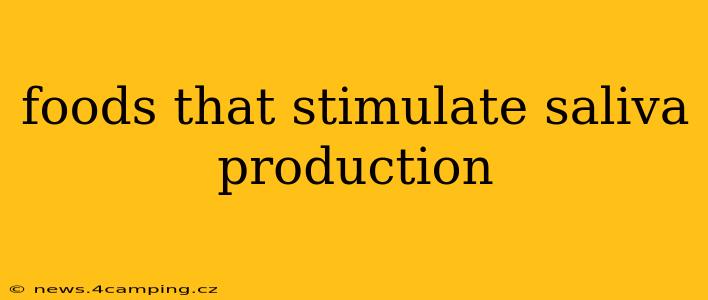Saliva, that often-overlooked bodily fluid, plays a crucial role in maintaining oral health, aiding digestion, and even contributing to taste perception. A dry mouth, or xerostomia, can be uncomfortable and lead to various oral health problems. Fortunately, many foods can stimulate saliva production, helping to alleviate dryness and promote overall oral well-being. This guide explores those foods and delves into the science behind their saliva-boosting properties.
What Causes Dry Mouth?
Before we dive into the foods that combat dry mouth, understanding its causes is essential. Dry mouth can stem from various factors, including:
- Dehydration: Insufficient water intake is a primary culprit.
- Medications: Many medications, particularly those for high blood pressure, depression, and anxiety, list dry mouth as a side effect.
- Medical conditions: Conditions like diabetes, Sjogren's syndrome, and HIV can contribute to decreased saliva production.
- Smoking and alcohol consumption: Both significantly reduce saliva flow.
- Age: Saliva production naturally declines with age.
- Radiation therapy: Head and neck radiation treatments can damage salivary glands.
Foods That Stimulate Saliva Production
Several foods naturally trigger your salivary glands to produce more saliva. These foods often share characteristics that stimulate the receptors in your mouth:
High-Water-Content Fruits and Vegetables:
- Watermelon: The high water content of watermelon is an obvious saliva stimulator. The sweetness also triggers salivation.
- Cucumber: Its refreshing coolness and high water content make it ideal for hydrating and stimulating saliva.
- Lettuce: Crisp lettuce, particularly romaine, requires more chewing, stimulating saliva flow.
- Celery: Similar to lettuce, celery’s fibrous texture requires more chewing, naturally increasing saliva production.
Acidic Foods:
- Citrus fruits (lemons, oranges, grapefruits): The tartness of citrus fruits is a natural saliva stimulant. However, moderation is key due to potential enamel erosion.
- Tomatoes: These mildly acidic fruits stimulate saliva production and add flavor to dishes.
Sour and Spicy Foods:
- Sour candies and snacks: These stimulate saliva production due to their sour taste, though excessive consumption should be avoided due to high sugar content.
- Spicy foods (chili peppers): The capsaicin in chili peppers creates a burning sensation that triggers increased saliva production to cool the mouth. However, individuals with sensitive stomachs should consume these in moderation.
Chewy Foods:
- Chewing gum (sugar-free): The act of chewing itself stimulates saliva production, even without the presence of flavor. Sugar-free gum is preferred to avoid dental issues.
- Nuts: The act of chewing nuts stimulates saliva production.
What Drinks Stimulate Saliva?
While focusing on foods, it's important to note that hydration is key. Water is the best beverage for stimulating saliva production by simply keeping your mouth moist.
Does Sugar Stimulate Saliva?
While sugary foods might initially stimulate saliva due to their taste, the long-term effects are detrimental to oral health. The sugar feeds bacteria, leading to acid production that erodes tooth enamel and increases the risk of cavities. Opt for naturally sweet alternatives.
How to Increase Saliva Naturally?
Beyond diet, several lifestyle changes can enhance saliva production:
- Stay hydrated: Drink plenty of water throughout the day.
- Quit smoking and limit alcohol consumption: These habits significantly reduce saliva flow.
- Chew sugar-free gum: This stimulates saliva production mechanically.
- Practice good oral hygiene: Regular brushing and flossing help maintain oral health and improve saliva flow.
Can Dry Mouth Be a Sign of a Medical Condition?
Yes, persistent dry mouth can be a symptom of underlying medical conditions. If you experience chronic dry mouth, consult a doctor or dentist to rule out any medical issues.
This guide provides a comprehensive overview of foods that stimulate saliva production. Remember that maintaining good oral hygiene and overall health are essential for optimal saliva production. If you have persistent dry mouth, consult a healthcare professional.
